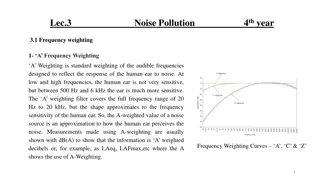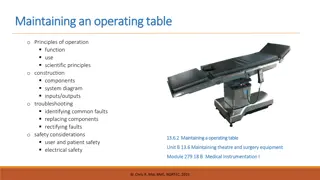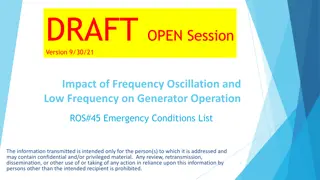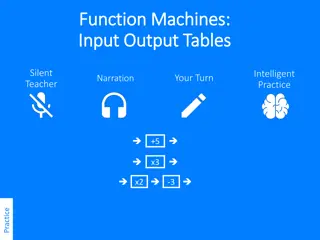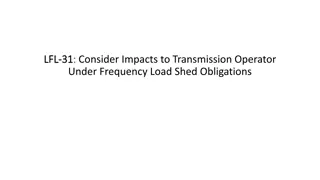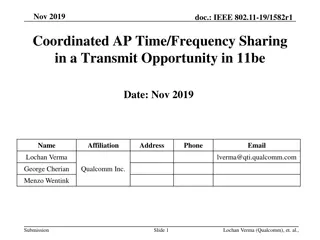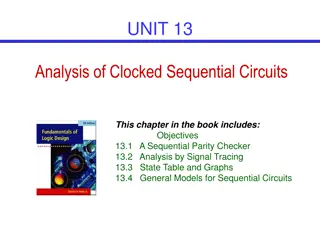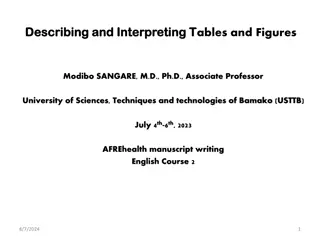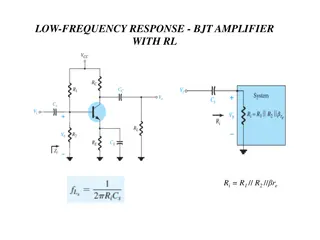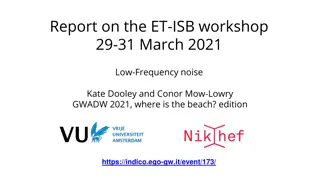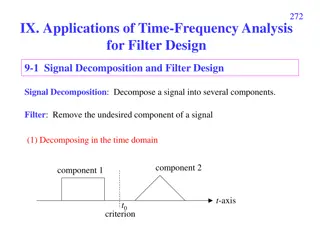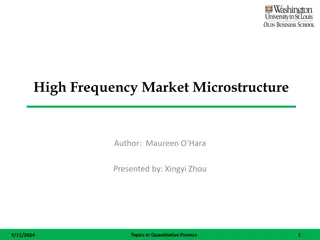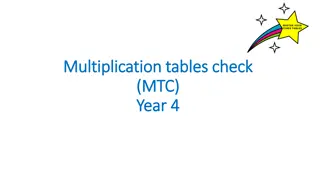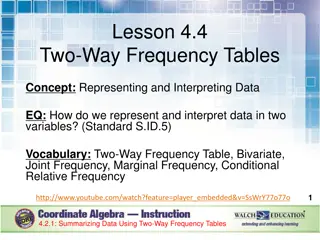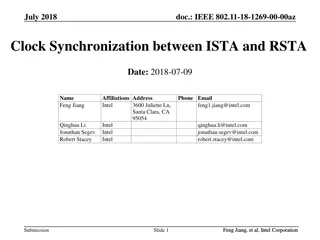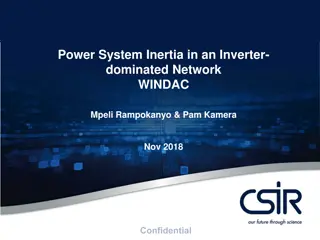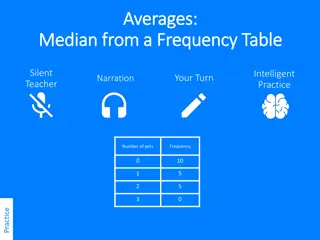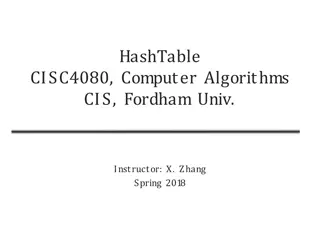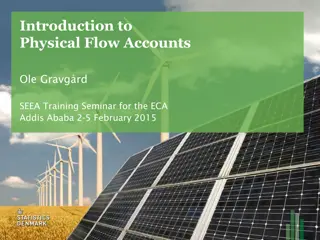Understanding Frequency Weighting in Noise Pollution Measurement
Frequency weighting is essential in noise pollution measurement to reflect how the human ear perceives noise. The A, C, and Z weightings are commonly used to represent different frequency responses. A-weighting covers the audible frequencies where the human ear is most sensitive, while C-weighting i
2 views • 7 slides
Load Frequency Control in Power Systems
Electric power systems require Load Frequency Control (LFC) to maintain a uniform frequency, distribute load among generators, and manage tie-line interchange schedules. LFC detects frequency changes, generates real power commands to adjust torque, and ensures stability within specified limits. Reas
8 views • 38 slides
If you are looking for Grazing Tables in Netley
If you are looking for Grazing Tables in Netley, Event Gourmet and Florals provide grazing tables, platters, dessert bars, cocktail food and florals for corporate functions, weddings, engagements, family events, parties and more! Whether you\u2019re hosting an event at your home, workplace, favourit
0 views • 6 slides
Weapons Training Strategies and Crew Gunnery Tables Overview
This article provides an in-depth look at the mounted machine gun gunnery gates and tables, crew gunnery progression, weapons training strategy, training gates, and crew gunnery tables. It outlines the structured approach to attaining and sustaining direct fire proficiency for various weapon systems
1 views • 16 slides
Maintaining an Operating Table: Principles and Functions
An operating table system comprises three components - the table column, table top, and transporter, each available in different versions for various surgical disciplines. Stationary tables are anchored to the floor, offering flexibility to adapt to patient needs. Mobile tables provide maneuverabili
0 views • 12 slides
Impact of Frequency Oscillation on Generator Operation: Emergency Conditions Analysis
Analyzing the impact of frequency oscillation and low frequency on generator operation during emergency conditions. Investigating how lower frequency affects units' ability to respond to deviations, system stability, and load shedding processes. Examining system responses during Energy Emergency Ale
0 views • 31 slides
Year 4 Multiplication Tables Check (MTC) 2022 Information
The Year 4 Multiplication Tables Check (MTC) in 2022 assesses children's fluency in recalling multiplication tables. It helps schools identify students needing additional support. The check will occur between June 6th and June 24th, 2022. It is digital and children have 6 seconds to answer each ques
0 views • 9 slides
Understanding Equivalent Ratios and Tables in Math
Learn how to write equivalent ratios, determine unknown terms in ratios and tables, plot equivalent ratios on a coordinate plane, and understand key vocabulary related to ratios such as ratio tables, scaling up/down, and coordinate planes. Discover how equivalent ratios are formed by scaling up or d
0 views • 28 slides
Importance of Times Tables and the Multiplication Tables Check for Children
Times tables play a crucial role in supporting children's mathematical foundation, essential for their future academic success. Understanding the significance of multiplication facts up to 12x12 is emphasized, aiding proficiency in later years. The Multiplication Tables Check, conducted digitally, e
1 views • 18 slides
Introduction to Function Machines and Input-Output Tables
Explore the concept of function machines and input-output tables through silent teacher-led practice sessions. Engage in intelligent exercises to strengthen your understanding. Work on completing tables and solving equations with step-by-step examples provided. Enhance your skills in identifying pat
1 views • 4 slides
Supporting Your Child with Multiplication Tables Check
Understand the Multiplication Tables Check for primary school children, its importance, what it entails, and how you can assist your child. Learn about the online assessment, expectations, preparation at school, and ways to support your child in mastering multiplication tables effectively.
0 views • 10 slides
Understanding Transmission Operator Obligations in Under-Frequency Load Shedding
ERCOT Compliance ensures that Transmission System Operators (TSOs) and Distribution System Operators (DSOs) have automatic under-frequency load shedding circuits in place to provide load relief during under-frequency events. The TSOs are required to shed a specific percentage of their connected load
0 views • 6 slides
Understanding Subsets and Two-way Frequency Tables in Data Science
Introduction to subsets in data analytics, explaining different ways of subsetting data such as row-based, column-based, and data-based subsetting. Additionally, the concept of two-way frequency tables is explored, highlighting how they display observed frequencies for two variables in a structured
1 views • 45 slides
Coordinated AP Time/Frequency Sharing in IEEE 802.11be
The document discusses the concept of Coordinated AP (CAP) Time/Frequency Sharing within a Transmit Opportunity (TXOP) in the IEEE 802.11be standard. It explains the procedures of Frequency and Time resource sharing, highlighting the benefits such as latency improvement and throughput fairness. Deta
0 views • 16 slides
Analysis of Clocked Sequential Circuits and Parity Checkers
This chapter delves into the analysis of clocked sequential circuits, focusing on topics such as sequential parity checkers, signal tracing, state tables and graphs, and models for sequential circuits. It covers concepts like Mealy and Moore machines, state equations, state graphs, timing charts, an
0 views • 38 slides
Understanding Functions: Tables, Graphs, and Formulas Based on Functions, Data, and Models
Explore the world of functions through tables, graphs, and formulas in this presentation based on the book "Functions, Data, and Models" by S.P. Gordon and F.S. Gordon. Learn how functions in the real world work, understand the relationship between variables, and see different representations of fun
0 views • 29 slides
Guidelines for Describing and Interpreting Tables and Figures in Academic Writing
Learn essential steps to effectively describe and interpret tables and figures in academic writing. Understand how to analyze data, interpret trends, and avoid biases. Gain insights into the anatomy of tables and figures, enabling clearer communication of research findings.
0 views • 18 slides
Analysis of Low-Frequency Response in BJT and FET Amplifiers
This analysis delves into the low-frequency response of BJT and FET amplifiers, examining the impact of various components such as resistors and capacitors on the cutoff frequencies. Detailed examples illustrate the calculation process for determining these frequencies based on specific parameters.
0 views • 18 slides
Insights from ET-ISB Workshop on Low-Frequency Noise and GWADW 2021
The ET Instrument Science Board held a workshop focusing on addressing key challenges related to low-frequency noise in gravitational wave detectors. Experts discussed topics such as mirror temperature, dealing with low-frequency noise realities, and facility limits. The workshop highlighted the sig
0 views • 13 slides
Applications of Time-Frequency Analysis for Filter Design
Signal decomposition and filter design techniques are explored using time-frequency analysis. Signals can be decomposed in both time and frequency domains to extract desired components or remove noise. Various transform methods like the Fourier transform and fractional Fourier transform are employed
1 views • 35 slides
ICAO Handbook on Radio Frequency Spectrum Requirements for Civil Aviation Workshops
This handbook provides insights into spectrum requirements for civil aviation workshops conducted in Egypt and Thailand in October 2016. It covers spectrum strategy, frequency management, spectrum overview for aviation, and frequency assignment planning to support the application of SARPs in Annex 1
0 views • 10 slides
High Frequency Market Microstructure - A Comprehensive Overview
Delve into the intricate world of high-frequency market microstructure with a detailed exploration of how traders operate, market structures, regulatory influences, and the evolution of trading platforms. Uncover the birth of High-Frequency Trading (HFT), the strategies employed by high-frequency tr
0 views • 12 slides
Understanding the Multiplication Tables Check (MTC) for Year 4 Students
The Multiplication Tables Check (MTC) is a statutory assessment for Year 4 pupils aimed at testing their fluency in times tables up to 12. With 25 questions, students have 6 seconds per question to recall answers. The MTC helps schools identify areas for additional support, with an optimal aim of 88
0 views • 7 slides
Understanding Two-Way Frequency Tables in Data Analysis
Explore the concept of representing and interpreting data in two variables using two-way frequency tables. Learn about joint frequency, marginal frequency, and conditional relative frequency through a practical example involving gender and nail services. Discover how to target specific audiences bas
0 views • 15 slides
Frequency Finder 6 Mapping Workshops Overview
Explore the Frequency Finder 6 Mapping, Export, and Special Functions workshops held in Egypt and Thailand in October 2016. The workshops cover topics such as mapping station coverage, exporting data to different formats, accessing historical frequency assignment records, and ensuring data integrity
0 views • 7 slides
Progress Report on Lunar-Mars Spectrum Group Work within SFCG
The Lunar-Mars Spectrum Group (LMSG) met to review important input documents related to lunar communications, including compatibility studies, frequency considerations, and frequency assignment guidelines. The group identified the need for further work to refine proposed reports and agreed on new ac
0 views • 17 slides
Exploring Two-Way Frequency Tables and Conditional Probabilities
Understanding two-way frequency tables, joint and marginal relative frequencies, and conditional probabilities through examples involving marbles, data organization, and car insurance quotes. Learn how to construct and interpret these tables to analyze relationships between two variables.
0 views • 25 slides
Understanding Descriptor Tables and Registers in Computer Systems
Descriptor tables in computer systems group segment descriptors together for efficient memory management. They consist of Global Descriptor Table (GDT), Local Descriptor Table (LDT), and Interrupt Descriptor Table (IDT). The Global Descriptor Table (GDT) is a crucial table that is shared by all prog
0 views • 18 slides
IEEE 802.11-18-1269-00-00az Clock Synchronization Investigation
In July 2018, a document was presented by Feng Jiang et al. from Intel Corporation focusing on clock synchronization between ISTA and RSTA in IEEE 802.11-18-1269-00-00az standard. The document delves into the impact of sampling clock errors on range estimation, carrier frequency synchronization in 1
0 views • 10 slides
Understanding Adverbs of Frequency in English Language Studies
Explore the usage of adverbs of frequency such as "every day," "twice a month," and "once a week" in English grammar through exercises and examples. Enhance your understanding of how to construct sentences using present simple tense to describe regular activities. Practice placing adverbs in sentenc
0 views • 53 slides
Understanding Logic Problems and Truth Tables
Explore the process of solving logic problems using truth tables, from defining the problem to implementing solutions in hardware and software. Learn to identify inputs and outputs, select appropriate truth tables, fill in truth tables, document solutions, and simplify solutions using Boolean Algebr
0 views • 16 slides
Understanding Trace Tables for Algorithm Testing
Trace tables are a valuable technique used to test algorithms step by step and identify logic errors. They involve using truth tables to track variable values or conditions. This content provides insights into trace tables, correcting errors in pseudocode, using examples for variable tracking, and c
0 views • 9 slides
Understanding Power System Inertia in Inverter-Dominated Networks
This study explores the impact of high levels of instantaneous inverter-based renewable energy penetration on power system inertia. It delves into fundamental concepts of energy balance, frequency control, load/frequency characteristics, and the importance of system inertia in maintaining grid stabi
0 views • 20 slides
Understanding Life Tables: Essential Tools in Demographic Analysis
Life tables are crucial tools in demography for analyzing mortality patterns and calculating life expectancy. They summarize mortality experiences of cohorts, provide insights on survival probabilities, and help estimate life expectancies for different populations. By constructing cohort and period
0 views • 31 slides
Understanding Frequency, Stem-and-Leaf Graphs, and Histograms in Data Analysis
Frequency, relative frequency, and cumulative relative frequency are explained with examples. Stem-and-leaf graphs help in organizing small data sets, while histograms display data with continuous variables. An example with heights of male soccer players demonstrates constructing histograms. Calcula
0 views • 11 slides
Understanding Averages and Medians in Frequency Tables
Explore how to calculate the mean number of siblings and the median number of pets from frequency tables. Learn through worked examples and practice exercises. The content covers various scenarios with clear explanations and visual aids, helping you grasp these essential statistical concepts effecti
0 views • 6 slides
Understanding Hash Tables and Hashing Concepts in Computer Algorithms
This content delves into the concept of Hash Tables, covering topics such as the support for dictionary operations, achieving constant time through direct address tables, case studies in web server maintenance, and an exploration of hashing functions and collision avoidance. It also touches upon key
0 views • 40 slides
Effective Regulation of Active Power in Renewable Energy Sources
The balance between generation and load is crucial in power systems operation. Various control levels ensure this balance, from frequency control to power station planning. DER units may lack control means, but specific configurations allow for frequency and voltage control. Performance indicators a
0 views • 51 slides
Overview of Physical Flow Accounts and Supply-Use Tables in Economic Analysis
Physical flow accounts play a crucial role in understanding the movement of resources between the environment and the economy. The seminar discussed the scope, purpose, and formation of physical flow accounts based on monetary supply and use tables. It highlighted the importance of widening the dime
0 views • 11 slides
System of Environmental-Economic Accounting Core Tables for Water
System of Environmental-Economic Accounting (SEEA) provides core tables and accounts focusing on water accounting and other environmental aspects. The core tables offer concise and relevant information essential for deriving indicators and formulating evidence-based public policies. These tables aim
0 views • 15 slides
